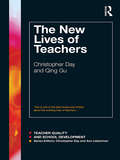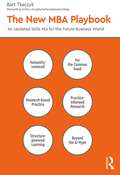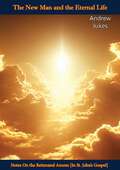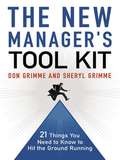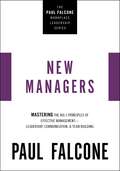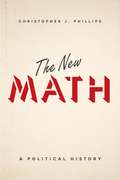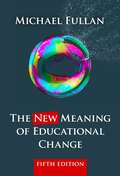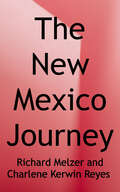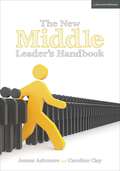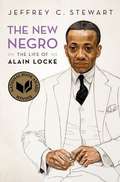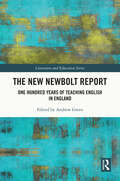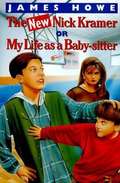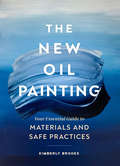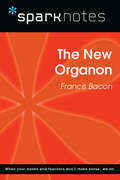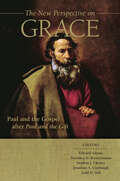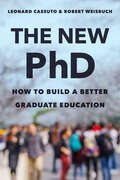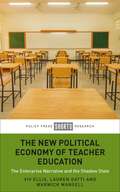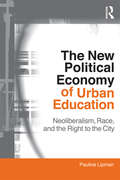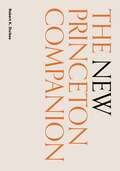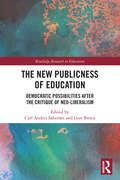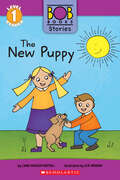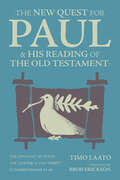- Table View
- List View
The New Lives of Teachers (Teacher Quality and School Development)
by Christopher Day Qing GuThe New Lives of Teachers examines the varied, often demanding commitments on teachers’ lives today as they attempt to pursue careers in primary and secondary education. Building upon Huberman’s classic study, it probes not only teachers’ everyday lives, but also the ways in which they negotiate the pitfalls of professional development and the different life and work ‘scenarios’ that challenge their sense of identity, well-being and effectiveness. The authors provide a new evidence-based framework to investigate and understand teachers’ lives. Using a range of contemporary examples of teaching, they demonstrate that it is the relative success with which teachers manage various personal, work and external policy challenges that is a key factor in the satisfaction, commitment, well-being and effectiveness of teachers in different contexts and at different times in their work and lives. The positive and negative influences upon career and professional development and the influences of school leadership, culture, colleagues and conditions are also shown to be profound and relate directly to teacher retention and the work-life balance agenda. The implications of these insights for teaching quality and teacher retention are discussed. This book will be of special interest to teachers, teachers’ associations, policy makers, school leaders, and teacher educators, and should also be of interest to students on postgraduate courses.
The New MBA Playbook: An Updated Skills Mix for the Future Business World
by Bart TkaczykThe job market is heating up, standards are higher – and competition is becoming fiercer. Want to accelerate your professional development but can’t because life is moving fast and time is short? As long as you have The New MBA Playbook, an innovative "MBA in a book", now is the ideal moment to, at your own pace, anywhere and anytime, boost your managerial proficiency so as to move forward positively, strategically, sustainably and ethically.By an award-winning industry expert and executive educator who’s had success in both corporate boardrooms and executive classrooms worldwide, The New MBA Playbook is a different kind of MBA sourcebook. It is humanity-centered (and beyond the AI hype!) and is organized into seven relevant, rigorous and readable two-unit modules ("mini-lectures"). This educational package condenses key MBA disciplines and topics into a playbook format that fits the work schedules of busy executives and professionals on the go, and delivers top MBA-quality intelligence in a matter of days, not years. Through The New MBA Playbook, you can deep dive into the essentials of business, creative strategies and fresh new thinking, and gain effective working knowledge of behavioral economics and policy, positive leadership and followership, strategic transformation, dialogic organization development, design thinking and innovation execution, brand coolness and storytelling, modern management consulting and executive coaching, global management strategies, cultural intelligence, and behavioral ethics, among other issues. The playbook, although designed to be worked through systematically, provides room for critical interpretation, enabling learning by "self-insight" and personal adaptation (the easy-to-use material is an "on-demand" resource from which you can "mix and match" modules freely and in any order, as all modules can stand alone, and you can customize the course to your needs).Re-imagining MBA education and challenging existing business practice, The New MBA Playbook, designed to bridge the gap between the MBA classroom and real life, will be invaluable to potential and current MBA students, seasoned business executives seeking to refresh and update their skills, management consultants, successful entrepreneurs – and to anyone who simply refuses to stop learning. This book is like having your own personal MBA professor!
The New Man and the Eternal Life: Notes On The Reiterated Amens [in St. John's Gospel]
by Andrew Jukes"The New Man and the Eternal Life: Notes on the Reiterated Amens [In St. John's Gospel]" by Andrew Jukes offers an in-depth and thought-provoking exploration of the profound truths contained within the Gospel of John. Jukes, a renowned theologian and biblical scholar, meticulously examines the significance of the repeated "Amen, Amen" statements made by Jesus throughout this Gospel, unveiling their deep spiritual and theological implications.In this insightful work, Jukes delves into the unique structure and message of the Gospel of John, focusing on how the reiterated "Amens" serve as emphatic affirmations of key teachings about the nature of Christ, the new life He offers, and the promise of eternal life. Each chapter of the book addresses a different "Amen, Amen" statement, providing a detailed analysis of its context, meaning, and relevance for believers.Jukes' scholarly yet accessible approach allows readers to grasp the intricate connections between these statements and the overarching themes of the Gospel. He elucidates how these affirmations underscore the transformative power of Christ's message, the reality of the new birth, and the eternal life that comes through faith in Him. Through his careful exegesis, Jukes highlights the enduring relevance of these teachings for contemporary Christians seeking a deeper understanding of their faith."The New Man and the Eternal Life" is not only a theological study but also a devotional work that encourages personal reflection and spiritual growth. Jukes' profound insights invite readers to contemplate the profound mystery of the new life in Christ and to embrace the assurance of eternal life promised in the Gospel.This book is an invaluable resource for theologians, biblical scholars, and any believer looking to deepen their understanding of the Gospel of John. Andrew Jukes' "The New Man and the Eternal Life" offers a rich and enlightening journey into the heart of one of the most beloved books of the New Testament, revealing the timeless truths that continue to inspire and transform lives.
The New Manager's Tool Kit: 21 Things You Need to Know to Hit the Ground Running
by Don Grimme Sheryl GrimmeIn this helpful guidebook, authors Don and Sheryl Grimme provide a fresh, friendly approach to tackling the challenges of management and leveraging your new position to help your organization succeed.Novice managers have their work cut out for them: all new skills to learn, different personalities to deal with, and greater responsibilities to fulfill. The New Manager's Tool Kit provides you with fast, powerful lessons to help them:increase productivity;unlock hidden talent;work with different types of people;communicate effectively;diagnose problems;coach both good and problematic employees;encourage teamwork;avoid burnout;eliminate conflict;and nurture the next generation of managers.With lessons covering both basic management skills as well as more advanced leadership tactics and bonus tips to help managers overcome the most difficult leadership challenges, The New Manager's Tool Kit provides those charged with managing and leading others the tools and real-world knowledge they need to succeed and open themselves up for further advancement.
The New Managers: Mastering the Big 3 Principles of Effective Management---Leadership, Communication, and Team Building (The Paul Falcone Workplace Leadership Series)
by Paul FalconeAn accessible and practical playbook by leading HR expert Paul Falcone to cultivate your most vital resource: having the right people working hard for you.Take the guesswork out of one of the most crucial elements for success—selecting the right people and managing and motivating them to success—using the wealth of knowledge contained within this ultimate desk reference.Chock full of wisdom and real-life scenarios on leadership, communication, and team building, this book covers topics ranging from basic to sophisticated, including:Identifying the best and brightest talent.Hiring for organizational compatibility.Addressing uncomfortable workplace situations.Creating an environment that motivates.Retaining restless top performers.Delegating in a way that develops your staff.And much, much more.Ultimately, this practical playbook is for managers at all levels and is a single, indispensable resource that will help them hire more effectively, exercise healthy communication, and build great teams.
The New Math: A Political History
by Christopher J. PhillipsAn era of sweeping cultural change in America, the postwar years saw the rise of beatniks and hippies, the birth of feminism, and the release of the first video game. It was also the era of new math. Introduced to US schools in the late 1950s and 1960s, the new math was a curricular answer to Cold War fears of American intellectual inadequacy. In the age of Sputnik and increasingly sophisticated technological systems and machines, math class came to be viewed as a crucial component of the education of intelligent, virtuous citizens who would be able to compete on a global scale. In this history, Christopher J. Phillips examines the rise and fall of the new math as a marker of the period’s political and social ferment. Neither the new math curriculum designers nor its diverse legions of supporters concentrated on whether the new math would improve students’ calculation ability. Rather, they felt the new math would train children to think in the right way, instilling in students a set of mental habits that might better prepare them to be citizens of modern society—a world of complex challenges, rapid technological change, and unforeseeable futures. While Phillips grounds his argument in shifting perceptions of intellectual discipline and the underlying nature of mathematical knowledge, he also touches on long-standing debates over the place and relevance of mathematics in liberal education. And in so doing, he explores the essence of what it means to be an intelligent American—by the numbers.
The New Meaning of Educational Change, Fifth Edition
by Michael FullanThe book that revolutionized the theory and practice of educational change is now in its Fifth Edition! Michael Fullan’s The New Meaning of Educational Change is the definitive textbook on the study of educational change. Based on practical and fundamental work with education systems in several countries, the text captured the dilemmas and leading ideas for successful large-scale systemic reform. This updated edition includes decisionmakers at all levels―from the local school community to the state and national level―and introduces many new and powerful ideas for formulating strategies and implementing solutions that will improve educational systems. <P><P>Widely used by university professors, policymakers, and practitioners throughout North America and in many other countries, this perennial bestseller shows us how to: <P><P>Develop collaborative cultures at the school level, while avoiding superficial versions of professional learning communities. <P><P>Foster district-wide success in all schools, illustrating how state and national systems can achieve total system transformation based on identifying and fostering meaning for educators at every level. <P><P>Integrate individual and systemic success, a rare feat in today’s school reform efforts. <P><P>The New Meaning of Educational Change, Fifth Edition is your comprehensive textbook on all aspects of the management of educational change―a powerful resource for everyone involved in school reform.
The New Mexico Journey: To Enrich and Inspire Humankind
by Gibbs Smith EducationThe New Mexico Journey is a history textbook program that is based on the New Mexico State Standards for social studies for use in grades 6 and older. The student edition places the state's historical events in the larger context of our nation's history.
The New Middle Leader's Handbook
by Caroline Clay James Ashmore'The New Middle Leader's Handbook' is the definitive go-to guide for all educators looking to take the leap into middle leadership, those wanting to become better middle leaders, or senior leaders seeking an authoritative manual for their school's middle leadership. Innovatively organised into chapters around the school year, taking readers from August to July and covering the full range of problems, challenges and opportunities they face in one of the most important roles in the school, and providing them with a framework to strategically plan and shape their year. Readers can use the book to structure their work into manageable portions while tailoring its content to their own personal school context, and its many activities and resources will provide opportunities for reflection, analysis and creative thinking.Operating as a practical manual and designed for easy reference, the book proposes methods, systems and procedures for: developing a personal leadership style; managing and driving dynamic change; building a successful team and challenging resistance; challenging underperformance of staff and students; using performance management to drive improvement; monitoring the quality of teaching and learning; tracking and measuring progress; preparing for inspection or internal review, including the self-evaluation process; organising meetings and leading professional development, including the use of the coaching model; prioritising workload and maintaining a work/life balance; developing a strategic learning and development plan; creating a culture of positive behaviour, aspiration and high expectations; innovating in teaching and learning; and designing a creative curriculum and curriculum enrichment. In addition, the book will guide those wishing to step up to middle leadership through the application and interview process, providing common-sense advice on the experience and skills required to become a successful middle leader. At its core, the book will be a source of stability for middle leaders that helps them to establish working principles that transcend changes to examinations, inspection criteria or DfE guidance. It offers inspiration and enable a reflective approach to the role. The book is comprehensive and knowledgeable, but crucially, accessible, written in a style that will eschew overly academic theorising, trendy soundbites or patronising waffle. In its final chapters, it looks beyond the first year to provide guidance on long-term strategic planning, career development and bridging the gap between middle and senior leadership. In short, 'The New Middle Leader's Handbook' will be the only book that an aspiring or current middle leader will ever need.
The New Middle Leader's Handbook
by Caroline Clay James Ashmore'The New Middle Leader's Handbook' is the definitive go-to guide for all educators looking to take the leap into middle leadership, those wanting to become better middle leaders, or senior leaders seeking an authoritative manual for their school's middle leadership. Innovatively organised into chapters around the school year, taking readers from August to July and covering the full range of problems, challenges and opportunities they face in one of the most important roles in the school, and providing them with a framework to strategically plan and shape their year. Readers can use the book to structure their work into manageable portions while tailoring its content to their own personal school context, and its many activities and resources will provide opportunities for reflection, analysis and creative thinking.Operating as a practical manual and designed for easy reference, the book proposes methods, systems and procedures for: developing a personal leadership style; managing and driving dynamic change; building a successful team and challenging resistance; challenging underperformance of staff and students; using performance management to drive improvement; monitoring the quality of teaching and learning; tracking and measuring progress; preparing for inspection or internal review, including the self-evaluation process; organising meetings and leading professional development, including the use of the coaching model; prioritising workload and maintaining a work/life balance; developing a strategic learning and development plan; creating a culture of positive behaviour, aspiration and high expectations; innovating in teaching and learning; and designing a creative curriculum and curriculum enrichment. In addition, the book will guide those wishing to step up to middle leadership through the application and interview process, providing common-sense advice on the experience and skills required to become a successful middle leader. At its core, the book will be a source of stability for middle leaders that helps them to establish working principles that transcend changes to examinations, inspection criteria or DfE guidance. It offers inspiration and enable a reflective approach to the role. The book is comprehensive and knowledgeable, but crucially, accessible, written in a style that will eschew overly academic theorising, trendy soundbites or patronising waffle. In its final chapters, it looks beyond the first year to provide guidance on long-term strategic planning, career development and bridging the gap between middle and senior leadership. In short, 'The New Middle Leader's Handbook' will be the only book that an aspiring or current middle leader will ever need.
The New Negro: The Life of Alain Locke
by Jeffrey C. StewartWinner of the 2018 National Book Award for Nonfiction. <P><P>A tiny, fastidiously dressed man emerged from Black Philadelphia around the turn of the century to mentor a generation of young artists including Langston Hughes, Zora Neale Hurston, and Jacob Lawrence and call them the New Negro -- the creative African Americans whose art, literature, music, and drama would inspire Black people to greatness. <P><P>In The New Negro: The Life of Alain Locke, Jeffrey C. Stewart offers the definitive biography of the father of the Harlem Renaissance, based on the extant primary sources of his life and on interviews with those who knew him personally. He narrates the education of Locke, including his becoming the first African American Rhodes Scholar and earning a PhD in philosophy at Harvard University, and his long career as a professor at Howard University. Locke also received a cosmopolitan, aesthetic education through his travels in continental Europe, where he came to appreciate the beauty of art and experienced a freedom unknown to him in the United States. And yet he became most closely associated with the flowering of Black culture in Jazz Age America and his promotion of the literary and artistic work of African Americans as the quintessential creations of American modernism. In the process he looked to Africa to find the proud and beautiful roots of the race. Shifting the discussion of race from politics and economics to the arts, he helped establish the idea that Black urban communities could be crucibles of creativity. Stewart explores both Locke's professional and private life, including his relationships with his mother, his friends, and his white patrons, as well as his lifelong search for love as a gay man. <P><P>Stewart's thought-provoking biography recreates the worlds of this illustrious, enigmatic man who, in promoting the cultural heritage of Black people, became -- in the process -- a New Negro himself.
The New Newbolt Report: One Hundred Years of Teaching English in England (Literature and Education)
by Andrew GreenThis book offers a pivotal re-evaluation of English teaching one century on from The Newbolt Report of 1921, responding to this seminal work and exploring its impact on issues and contemporary aims of English teaching today. Bringing together a range of experts in English higher education, the book provides a twenty-first century inflection on the enduring issues highlighted by Newbolt's original report. It examines topics including the demands of assessment, the narrowing of the literary curriculum, the impact of education reform, targets related to social mobility, class and widening participation, as well as broader questions about the function of literature and the arts in education. Chapters also consider issues surrounding the promotion of community cohesion, diversity and how technological advances might reshape literary education. This unique re-evaluation of the achievements and findings of the New bolt Commission will be essential reading for those researching English education and the history of education.
The New Nick Kramer, or My Life as a Babysitter
by James HoweFourteen-year-old Nick signs up for a baby-sitting and child-care class to be near a beautiful new girl at school, but at first his attempts at real baby-sitting prove to be less than successful.
The New Oil Painting: Your Essential Guide to Materials and Safe Practices
by Kimberly BrooksHere is everything you need to know about getting into oil painting—and maintaining a safe, solvent-free oil painting practice—in a slim, sophisticated guide.Oil painting is an exciting and adventurous medium, but aspiring artists can feel daunted by complex setups and the thought of using harsh chemicals. All of that changes now. The New Oil Painting walks you step-by-step through oil painting fundamentals—which materials you actually need, how to mix paint, how to set up your painting space—and, most revolutionary of all, how to eliminate harmful solvents from your work and replace them with safe, effective substitutes. This instructional handbook is organized into chapters with helpful diagrams throughout illustrating various techniques and tools. Whether you're a true beginner or have been painting with oils for years, you will find that this book has everything you need to build a new, thriving, toxin-free practice.• UNIQUE APPROACH: Not only does this book help aspiring artists build a repertoire of skills and materials, it also offers all artists, regardless of their experience levels, methods for eliminating solvents and other toxic substances from their oil painting practices. What was once a dangerous pastime is now a guilt-free, health-conscious, and rewarding activity. And using safe, nontoxic materials is better for the environment!• LONG-TERM USE: Good art instruction can deliver over a long period of time, and this handy guide is no exception. Along with being able to use this as an entryway into oil painting, you can also use it for reference or reread sections when you need a brushup.• EXPERT AUTHOR WITH IMPRESSIVE CREDENTIALS: Painter Kimberly Brooks was the founding arts editor at Huffington Post. As a painter, she exhibits her work frequently throughout the United States and was a featured artist with the National Endowment for the Arts. She has led oil painting workshops, and now she shares her vast knowledge of the subject in this accessible and comprehensive handbook.Perfect for:• Artists and art aspirants interested in exploring a new medium• Experienced oil painters looking to eliminate solvents from their practices• Painting students and teachers
The New Organon (SparkNotes Philosophy Guide)
by SparkNotesThe New Organon (SparkNotes Philosophy Guide) Making the reading experience fun! SparkNotes Philosophy Guides are one-stop guides to the great works of philosophy–masterpieces that stand at the foundations of Western thought. Inside each Philosophy Guide you&’ll find insightful overviews of great philosophical works of the Western world.
The New Perspective on Grace: Paul and the Gospel after Paul and the Gift
by Edward Adams, Dorothea H. Bertschmann, Stephen J. Chester, Jonathan A. Linebaugh, and Todd D. Still, eds.For those inspired by Barclay&’s Paul and the Gift Over the course of his academic career, John M. G. Barclay has transformed how we think about Paul. Barclay&’s contributions to Pauline Studies reached a new height with the publication of his award-winning Paul and the Gift, in which he presents a sophisticated reading of Paul&’s theology of grace within the context of gift-giving in the Greco-Roman world. But where does Pauline scholarship go from here? Featuring a diverse group of internationally renowned scholars, The New Perspective on Grace collects essays inspired by Barclay&’s magnum opus. These essays broadly explore the implications of grace and gift across a variety of fields: biblical studies, theology, reception history, and theology in practice. Topics include: • Paul&’s soteriology • The role of grace in Paul&’s life and ministry • Implications of the New Perspective on Paul • Divine giving in the Gospels • Gift-giving and Christian aesthetics • Interpretations of Pauline grace from the patristic period to the present • Self-giving and self-care • Grace and ministry in marginalized communities The New Perspective on Grace is essential reading for all students and scholars who want to understand the current state of Pauline scholarship.Contributors: Edward Adams, Dorothea H. Bertschmann, Ben C. Blackwell, David Briones, Marion L. S. Carson, Stephen J. Chester, Susan Grove Eastman, Troels Engberg-Pedersen, Simon Gathercole, Beverly Roberts Gaventa, John K. Goodrich, Judith M. Gundry, Jane Heath, David G. Horrell, Jonathan A. Linebaugh, Joel Marcus, Orrey McFarland, Dean Pinter, Todd D. Still, Paul Trebilco, Michael Wolter
The New PhD: How to Build a Better Graduate Education
by Leonard Cassuto Robert WeisbuchFor too many students, today's PhD is a bridge to nowhere. Imagine an entering cohort of eight doctoral students. By current statistics, four of the eight—50%!—will not complete the degree. Of the other four, two will never secure full-time academic positions. The remaining pair will find full-time teaching jobs, likely at teaching-intensive institutions. And maybe, just maybe, one of them will garner a position at a research university like the one where those eight students began graduate school. But all eight members of that original group will be trained according to the needs of that single one of them who might snag a job at a research university. Graduate school has been preparing students for jobs that don't exist—and preparing them to want those jobs above all others. In The New PhD, Leonard Cassuto and Robert Weisbuch argue that universities need to ready graduate students for the jobs they will get, not just the academic ones. Connecting scholarly training to the vast array of career options open to graduates requires a PhD that looks outside the walls of the university, not one that turns inward—a PhD that doesn't narrow student minds but unlocks and broadens them practically as well as intellectually. Cassuto and Weisbuch document the growing movement for a student-centered, career-diverse graduate education, and they highlight some of the most promising innovations that are taking place on campuses right now. They also review for the first time the myriad national reform efforts, sponsored by major players like Carnegie and Mellon, that took place between 1990 and 2010, look at why these attempts failed, and ask how we can do better this time around. A more humane and socially dynamic PhD experience, the authors assert, is possible. This new PhD reconceives of graduate education as a public good, not a hermetically sealed cloister—and it won't happen by itself. Throughout the book, Cassuto and Weisbuch offer specific examples of how graduate programs can work to:• reduce the time it takes students to earn a degree;• expand career opportunities after graduation;• encourage public scholarship;• create coherent curricula and rethink the dissertation;• attract a truly representative student cohort; and • provide the resources—financial, cultural, and emotional—that students need to successfully complete the program.The New PhD is a toolbox for practical change that will teach readers how to achieve consensus on goals, garner support, and turn talk to action. Speaking to all stakeholders in graduate education—faculty, administrators, and students—it promises that graduates can become change agents throughout our world. By fixing the PhD, we can benefit the entire educational system and the life of our society along with it.
The New Political Economy of Teacher Education: The Enterprise Narrative and the Shadow State
by Viv Ellis Lauren Gatti Warwick MansellViv Ellis, Lauren Gatti and Warwick Mansell present a unique and international analysis of teacher education policy. Adopting a political economy perspective, this distinctive text provides a comparative analysis of three contrasting welfare state models – the US, England and Norway – following the 2008 Global Financial Crisis (GFC). Arguing that a new political economy of teacher education began to emerge in the decade following the GFC, the authors explore key concepts in education privatisation and examine the increasingly important role of shadow state enterprises in some jurisdictions. This topical text demonstrates the potential of a political economy approach when analysing education policies regarding pre-service teacher education and continuing professional development.
The New Political Economy of Urban Education: Neoliberalism, Race, and the Right to the City (Critical Social Thought)
by Pauline LipmanUrban education and its contexts have changed in powerful ways. Old paradigms are being eclipsed by global forces of privatization and markets and new articulations of race, class, and urban space. These factors and more set the stage for Pauline Lipman's insightful analysis of the relationship between education policy and the neoliberal economic, political, and ideological processes that are reshaping cities in the United States and around the globe. Using Chicago as a case study of the interconnectedness of neoliberal urban policies on housing, economic development, race, and education, Lipman explores larger implications for equity, justice, and "the right to the city". She draws on scholarship in critical geography, urban sociology and anthropology, education policy, and critical analyses of race. Her synthesis of these lenses gives added weight to her critical appraisal and hope for the future, offering a significant contribution to current arguments about urban schooling and how we think about relations between neoliberal education reforms and the transformation of cities. By examining the cultural politics of why and how these relationships resonate with people's lived experience, Lipman pushes the analysis one step further toward a new educational and social paradigm rooted in radical political and economic democracy.
The New Politics Of Race And Gender: The 1992 Yearbook Of The Politics Of Education Association (Education Policy Perspectives Ser.)
by Catherine MarshallWhat can schools do to eliminate sexism and racism? By the 1990's with shifting demographics, disillusionment with conventional liberal policies and new political coalitions, the politics of race and gender requires new analyses. The chapters in this book demonstrate how the politics of race and gender enter into proposals for parental choice, business involvement in schools, definitions of good leadership, special schools for minority children, curriculum debates, and debates about testing and accountability. Catherine Marshall provides the political historical context of race and gender politics in schools, and the following eighteen chapters provide a greater in-depth analysis. The chapters include work of scholars and policy analysts focusing on policy and policy implementation at all levels of school politics in the US, Australia and Israel. The book ends with critical policy analysis, raising deep theoretical questions and pulling out the chronic race and gender issues in education politics.
The New Princeton Companion
by Robert K. DurkeeThe definitive single-volume compendium of all things PrincetonThe New Princeton Companion is the ultimate reference book on Princeton University’s history and traditions, personalities and key events, and defining characteristics and idiosyncrasies. Robert Durkee brings a unique insider’s perspective to the school’s dramatic transformation over the past five decades, showing how it has become more multicultural, multiracial, and multinational, all the while advancing its distinctive academic mission.Featuring more than 400 entries presented alphabetically, this wide-ranging collection covers topics from academic departments, cultural resources, and student organizations, hoaxes, and pranks to athletic teams, the town of Princeton, and university presidents. There are entries on coeducation, women, people of color, traditionally underrepresented groups, the diversification of campus iconography, and the protest activity that helped to usher in many of these changes. This marvelous compendium also includes annotated maps tracing the growth of the campus over more than two and a half centuries, lists ranging from prizewinners of many kinds to Olympic medalists, and an illustrated calendar that highlights something that happened in Princeton’s history on every day of the year.Now completely updated, revised, and expanded from the classic 1978 edition, The New Princeton Companion tells you virtually everything there is to know about this remarkable institution of higher learning, revealing what it stands for, what it aspires to, and how it evolved from a tiny colonial college to one of the most acclaimed research universities in the world.
The New Publicness of Education: Democratic Possibilities After the Critique of Neo-Liberalism (Routledge Research in Education)
by Gert Biesta Carl Anders SäfströmThis book explores democratic possibilities for education after the critique of the impact of neo-liberalism on educational policy and practice. Together, the authors investigate the contours of a ‘new publicness’ of education. This edited volume refers to well-established critiques that expose how neoliberal governance has normalised the privatisation of public life and undermined the public nature of education. Through historical reconstruction, theoretical exploration, and analyses of educational policies and practices, chapters take a novel approach by investigating democratic possibilities within and beyond the current neoliberal hegemony in education. Covering a range of educational settings – from early childhood education through to higher and professional education – chapters spotlight the Irish educational and political context, as well as exploring international implications. Ultimately, this book opens up new avenues for discussion around public education and its future, and will therefore be of great interest to researchers and students in the fields of educational theory, education politics, educational policy and democratic education.
The New Puppy (Scholastic Reader, Level 1)
by Lynn Maslen KertellExperience the delight—and hard work—of adopting a pet in this Scholastic Level 1 Reader from the creators of the beloved Bob Books® learn-to-read phonics box sets. Perfect for reading alongside the Stage 3 Bob Books box sets, or for any child reading at Guided Reading Level G.Jack and Anna want a puppy. A puppy will be fun! They adopt a little brown dog at the animal shelter and name him Buddy. Buddy loves to play . . . and to make mischief! Can Jack and Anna take care of Buddy and have fun, too?Bob Books Stories include:Words that children can sound out (decode); both short and long vowelsSight wordsSimple sentence structuresSimple, colorful, friendly illustrations that support children’s reading and add fun!Longer stories than the books in the Bob Books box sets, which helps children build reading endurance Bob Books has been helping children learn to read through simple phonics and playful text and illustrations for more than forty years. Your child will soon join the millions of happy kids who say, “I read the whole book!”
The New Quest for Paul & His Reading of the Old Testament: The contrast between the "Letter" & the "Spirit" in 2 Corinthians 3:1-18
by Timo LaatoThe author is known as a strong opponent of the so-called New Perspective on Paul. In this book, he seeks to move beyond that debate and open new vistas in Pauline research. There is a need for much revision. The author first dives in to a detailed exegetical study of 2 Corinthians 3, a chapter that has a reputation of being an exegetical nightmare. He examines the interpretational problems associated with the opposition between the letter that kills and the Spirit that gives life. Fresh insights emerge. Ultimately, the whole issue turns on the question whether to understand the Old Testament ac cord ing to the "literal-letteral" or "literal-spiritual" sense. As a consequence, Paul breaks up with Ju da ism and pulls down the works of the law since he competes against the view of observing the Torah "in flesh" and ac cording to the "literal-letteral" meaning of the text. He regards such a reli gious pur suit as the worst form of human self-righteousness and self-praise (despite the serious efforts to true piety). On the other hand, Christians have undergone a transformation in terms of re-creation, rege neration, resusci tation, resur rec tion, or revitalization. The Spirit gives them life. He reigns in them. Hence, Christians do fulfill the whole Mosaic law. Yet, they fulfill it "in Spirit" and not "in flesh," in other words, according to the "literal-spiritual" and not "literal-letteral" sense of Scripture. As a consequence, they do not bolster their self-righteousness and self-praise. To corroborate his the sis, the author draws on similar wordings in other Pauline letters and several passages in the Old Tes ta ment from Exodus, Jeremiah, and Ezekiel. The author concludes that the New Perspec tive on Paul has run its course. A New Quest for Paul is needed. Therefore, this book is needed.
